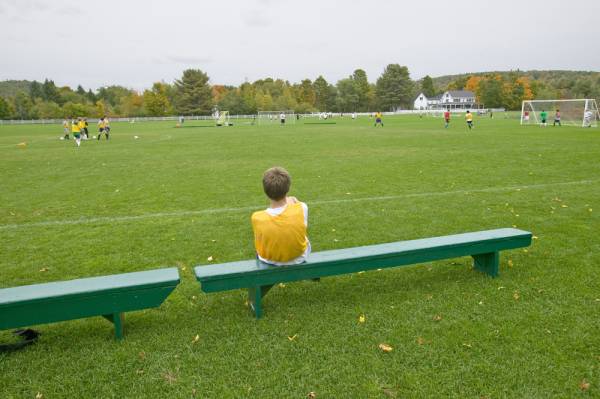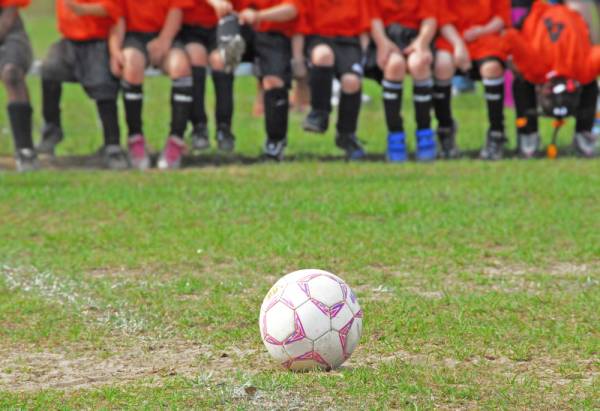As a coach and trainer, as well as a parent of youth athletes, I am going to take a deep breath, throw my shoulders back, and yell out the unthinkable, “It’s not always bad for a youth athlete to sit on the bench!”
Before you become outraged, hear me out. This article will identify appropriate reasons that your child may be sitting out, how to use sitting out to your child’s advantage, and when and how to speak to the coach about your child sitting out.
On the Bench
We have all heard the phrase that some coaches or leagues like to use, “If you pay, you play.” This may be the reason you chose your child’s coach or team, or it may be the reason you speak to the coach about your child sitting out.
The pay-and-play mantra may well be appropriate for those youth athletes starting out in a sport, for summer or weekend camps that introduce sports skills, or for clinics that emphasize certain skill sets. But this mindset is not appropriate when there is a noticeable difference in the playing abilities of athletes, when there is a glaring difference in sports specific skills between athletes, and when there is an obvious difference in the physical size and development of athletes.
“Benched or not benched, there is a time and place for a child to play, and a time and place for a child to sit.”
When is it appropriate for youth athletes to sit out? There are certain circumstances that warrant time on the bench:
- Switching teams or coaches. If your child has recently switched teams or coaches, then he or she may have to first prove his or her skill set. It may take a few practices or games before your child is getting his or her usual playing time.
- Your child may no longer be the star. Youth athletes develop at various rates, both physically and mentally. Even if your child was the star last year, that does not guarantee he or she will be the star this year.
- Attitude. Does your child have a good attitude toward the coaches, team, sport, referees, and other teams? If not, you can expect that the coach will pull your child, no matter how good of an athlete he or she is.
- Grades. Many coaches require their athletes to bring in their report cards. Some coaches, especially on travel teams, require the athlete to maintain a certain grade point average. If your child is not meeting those standards, then he or she may sit out until those standards are met.
- Unsportsmanlike behavior. With parents, teams, and coaches all fighting, the line has to be drawn. Bad sportsmanship is the fastest way to earn a spot on the bench, and rightfully so. Bad sportsmanship should not be tolerated. Ever.
- Missing games or practices. Does your child frequently miss games and practices? Does your child let the coach know? Missing an occasional practice or game for legitimate reasons is acceptable. Missing practices or games because your child wanted to go to a birthday party and forgot to let the coach know is not acceptable.

- When your child is injured or sick. It is the coach’s responsibility to sit an injured or sick child out of the game until he or she is fully recovered, no matter what the child or parent says. Case in point: As a strength and conditioning coach, I worked with a young baseball player who, after a four-day baseball tournament, was complaining of elbow pain. After the usual recommendations of seeing a doctor, resting, and icing, the child had a diagnosis – repetitive stress injury. The child was supposed to completely rest his arm for two weeks, and then get a reevaluation. Even with a doctor’s note stating the diagnosis and prescription, the father asked the pitching coach and me to continue working the child’s arms for strength. I did not train the child during this prescribed period of rest, but the pitching coach did. The result? A torn growth plate for the athlete with months of pain and rehabilitation.
- When your child’s abilities do not match the team’s or the opponent’s. When an athlete’s physical, mental, and athletic development is slower than the team’s, there is a good chance the athlete will be hurt. It is the coach’s responsibility to keep the child safe, and play him or her in positions or situations that will mitigate injury.
- When your child does not have a clear understanding of the game or strategy. Is your child new to the sport? Is your child a confident player? Some coaches will have the child observe the game for a short period of time before they play. Case in point: my youngest daughter started soccer at the age of eleven. She did not fully understand the rules and was the only one who had never played soccer before. The coach sat her out for most of the first game so she could watch. The assistant coach sat with her and explained the plays. Sitting out was appropriate. As my daughter gained more experience and understanding, she sat on the bench less and less.

How to Use Sitting Out to Your Child’s Advantage
As harsh as this sounds, there are some advantages to your child sitting out. You just have to look for them.
- Learning the game. As stated in the example above, newcomers may need to observe the rules and strategies of a sport to gain self-confidence and an understanding of the game before playing.
- Building a team. Every athlete needs to learn how to be a good teammate, through supporting the team and the coach. Additionally, when starters sit the bench, they can gain understanding and appreciation for their non-starter teammates.
- Fueling the fire. Sitting the bench may make the youth athlete work that much harder in practice and at home. It may give athletes the motivation, drive, and commitment needed to make them a starter.
- Reminders. As cited earlier, sitting out may be the result of misbehavior on the athlete’s part. Actions have consequences on and off the playing field. Sitting out might be the reminder the child needs to correct misbehaviors or to rise to the standards of the coach.
When to Talk to the Coach
While the coach has the ultimate say over a child playing or not, children and parents have rights, as well. If your athlete makes all the games and practices, yet still remains on the bench, it is time for the athlete to address the coach.
“The coach should be direct and answer the athlete with practice tips, while addressing areas to improve.”
A good way for your child to start the conversation is, “Coach, what can I do to improve my skills so that I can start playing in games?” The coach should be direct and answer the athlete with practice tips, while addressing areas to improve. If the child does as the coach has asked, yet still remains on the bench, it is time for the parent to address the coach.
Embracing Life Lessons
Benched or not benched, there is a time and place for a child to play, and a time and place for a child to sit. Just as youth athletes learn life lessons on the playing field, they can also learn life lessons on the bench, as long as they get their playing time in.
Read more about youth athletics:
- 3 Steps to Nip Youth Performance Anxiety in the Bud
- The Real and Present Danger of Overtraining Youth Athletes
- 5 Ways to Develop the Fighting Spirit in Youth Athletes
- What’s New On Pulse Beat Fit Today
References:
1. Bob Howdeshell, “BENCHED,” Sports Parents. Accessed May 3, 2015.
Photos courtesy of Shutterstock.






